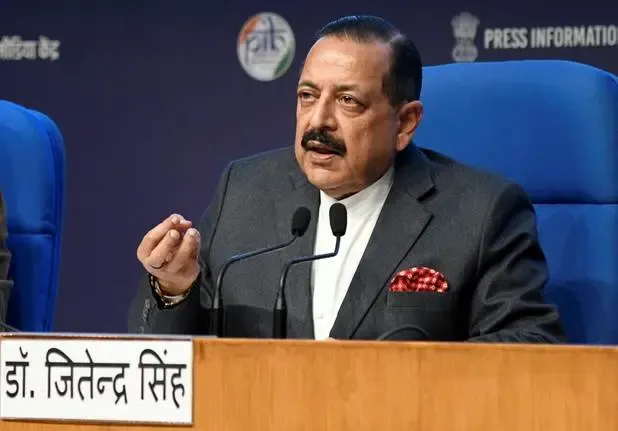Indian Space Economy Projected to Expand Nearly 5-Fold to $44 Billion in the Next Ten Years: Minister

New Delhi, Jan 1 (NationPress) The Indian space economy is poised to expand nearly five times, increasing from $8.4 billion to approximately $44 billion over the next decade, highlighted Union Minister of State for Science and Technology, Dr. Jitendra Singh.
In 2023 alone, investments in this sector reached a remarkable Rs 1,000 crore, establishing India as a leading player on the global stage. The country’s space sector has also become a vital source of foreign exchange income.
Of the 220 million euros generated from launching foreign satellites, 187 million euros was earned in the past eight years. Countries that have benefited from ISRO’s services include the United States, France, Japan, and others.
Dr. Singh praised ISRO’s Space Docking Experiment (SPADEX) mission, stating that this accomplishment elevates India to the ranks of global leaders in space docking technology.
The SPADEX mission is a crucial initiative by ISRO aimed at developing and demonstrating technologies for spacecraft rendezvous, docking, and undocking using two small satellites.
“These capabilities are essential for future missions, including satellite servicing, operations at space stations, and interplanetary exploration,” the minister informed reporters in the national capital.
The main objectives of SPADEX, as stated by the Minister, include demonstrating technology for spacecraft rendezvous and docking, showcasing controllability under docked conditions to prolong the life of target spacecraft, and testing power transfer between docked satellites.
The mission will also encompass post-docking activities, with spacecraft carrying out independent payload operations.
According to Dr. Singh, the docking is anticipated to take place on January 7, 2025, at noon.
The minister further pointed out a significant partnership between the Department of Biotechnology and ISRO to investigate the application of biological sciences in space.
“Under the leadership of Prime Minister Narendra Modi, India will spearhead in 'Space-Biology' by examining physiological changes in space environments,” he noted.
The 2023 New Space Policy has facilitated private sector involvement in ISRO's endeavors. This policy has resulted in a dramatic increase in space startups, rising from a single-digit figure in 2021 to nearly 300 in 2023.
Prominent startups include AgniKul Cosmos, which established a private launchpad on ISRO premises, and Skyroot, which executed India’s first private sub-orbital launch.
“These startups are strengthening ISRO’s infrastructure and drawing international attention from firms like SpaceX,” Dr. Singh remarked.










